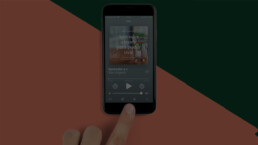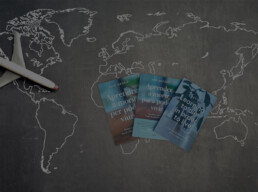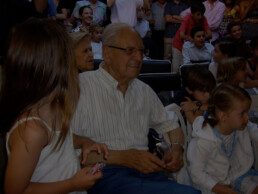A Meaningful Life. + Xavi Argemí 14/8/1995 - 22/4/2025
Dear friends of Xavi,
We, his family, are writing these lines to share with you the news of Xavi's passing, which occurred during the early hours of April 22nd, while he was sleeping.
Over the past few weeks, Xavi’s physical condition had not significantly worsened. Duchenne muscular dystrophy continued its course — an inexorable but slow progression, like a river lazily flowing across a plain. If you looked closely, you could notice small changes, each one gradually giving more ground to physical limitations. Yet it was his spirit that remained strong, unwilling to retreat in any of the battles life placed before him.
Monday, April 21st, began with the sad news of Pope Francis’s death. Surely, Xavi must have recalled the dedication the Pope had written to him in his book: “To Xavi, with my blessing and my gratitude for your witness. And asking you to pray for me. Francis.” And he must have prayed for him.
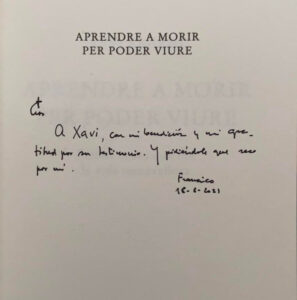
Despite this, it was a day of celebrations. As is tradition, he gifted the Easter mona (a traditional Easter cake Godparents in Catalonia give to their godchildren) to his godson, Pep, and they shared a meal with his parents and a few other family members. The mona was, as could only be expected, a football decorated with a blue and red ribbon: the King’s Cup final was approaching, and he was already getting excited. It also marked the beginning of a busy trimester: he was personally coordinating preparations for his sister Mercè’s 40th birthday celebration and his parents’ golden wedding anniversary.
Just a week before, he had appeared on the front page of La Vanguardia (an important Barcelona newspaper) in a report about euthanasia, presenting two contrasting views: one from a person in favor of assisted suicide, and Xavi’s, offering his final defense of the culture of life. You can find the article at this link.
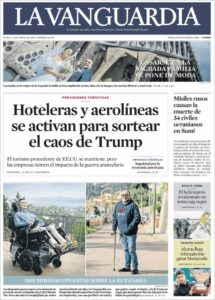
The story of how Xavi once again made front-page news began after a television station aired a pro-euthanasia TV program. In his way — always respectful towards those who thought differently but steadfast and compelling when defending the dignity of human life from his perspective — he felt that that television piece could not have the last word. He wrote a letter to the newspaper, and La Vanguardia, which had already given him a voice several times before, reached out to him. Xavi was persistent, as you all know.
He was happy to have been able to express his opinion.
Before turning off the light and going to sleep on the night of Monday the 21st, he told his mother: “I love you.” These were, literally, the last words he ever spoke. He fell asleep and did not wake up again in this world.
The impact of his passing resonated with many people, who came to the wake held at his own home. The funeral took place on Thursday the 24th, at the parish church of Sant Fèlix in Sabadell, which was filled to overflowing.
The coffin was carried in by his brothers and brother-in-law, followed by his sisters and all his cousins. His closest friends carried it out. In the memorial card, the family included a quote from his final interview in La Vanguardia and a saying from a saint he deeply admired:
"My life has meaning. I love and I feel loved." — Xavi Argemí
"To be happy, what you need is not an easy life but a heart which is in love." — Saint Josemaría
At the end of this message, we have included some images from the funeral.
On behalf of the entire family, we would like to personally thank you for all the affection you have shown him. If you wish to contact us, you can continue to do so at the Gmail address he himself shared: xaviargemib@gmail.com
His life had meaning because he loved.
May he rest in peace.
The Argemí Ballbè Family

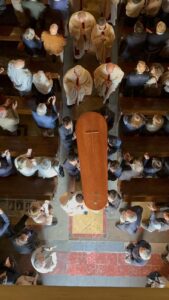

Next stop, France
My book has reached a new phase, the fourth, in its journey to reach other readers: the publication of the French edition. Everything has evolved naturally, one language leading to another. After seeing that the English edition had generated some interest (although it wasn’t a big success) and that the promotional means were limited, I decided to continue exploring new audiences.
I know several people who live in France or French-speaking countries, and this made me think it would be a good opportunity to translate and distribute the book in French. So I decided to get to work and make it happen.
The Translation Process
The first person who offered to do the translation was a retired friend who has always shown great interest in everything related to France and speaks French fluently. I’m very grateful to him, as he made the first version with great dedication and enthusiasm. However, I knew that a native French speaker needed to review the text to ensure its quality.
At this point, a relative of my father’s stepped in. She’s the daughter of a German father and a French mother and is perfectly fluent in both languages. She has also spent many years teaching languages. I asked her if she could correct and fine-tune the first version, and she gladly accepted. In a couple of months, she had the final translation ready, and I must say it turned out great.
Over the past year, I’ve been studying French to be able to read the book carefully and ensure that the translated text remains true to the original. I think this effort has helped me ensure that the message stays intact in the new version.
Search for a Publisher in France
The next step was to find a publisher interested in releasing the French edition. To do so, I contacted a friend who has been living in Paris for many years and had read my book. He really liked it and offered to help me. In addition, he had run a publishing house for many years and knew the publishing world in France very well. He also had many contacts in the publishing industry.
This friend committed to finding a publisher interested in my book. We thought it would be a good idea to release it in the summer of 2024, coinciding with the debate on the euthanasia law in the French National Assembly. Perhaps my book could provide a useful perspective in that context.
My friend first contacted his old publishing house. Although they initially showed interest, they eventually decided not to publish it for reasons of overflow. Fortunately, he kept looking and finally found a Parisian publisher, Pierre Téqui, who was very enthusiastic about the project and wanted to move forward with it.
Publication in France
After a few weeks of negotiations, we signed a contract with Pierre Téqui to publish the book in French. The edition will be titled Ma Vie Jusqu’au Bout (“My Life Until the End”) and will be available starting November 13th in French-speaking bookstores and on Amazon.
This new title reflects the book’s central message: living fully until the end, even in the most difficult moments. I’m thrilled that the book will reach a new audience, and I hope it can inspire and help many people who have yet to discover my story.
Acknowledgments and diffusion
I want to thank everyone who made this new step in my book’s journey possible: my retired friend for his initial translation, my relative for her impeccable revision, and my friend in Paris for finding a publisher who believed in this project.
I also encourage everyone who knows French-speaking people who enjoyed my book to help spread the word. Ma Vie Jusqu’au Bout is now available for pre-order, and I hope it reaches many French-speaking readers soon. If you’d like more information, you can find the book doing click here.
So, next stop: France.
The Process Behind The Audiobook
A few weeks ago my book "Learning to die in order to live" was published in audiobook format, for now in Spanish. In this article, I want to tell you how this new edition came about.
The Origin of the Idea
It all started when I wanted to write an article, I was looking for phrases to publish and I wanted to be prepared for future interviews or editions in other languages. To do this, I needed to refresh my memory with a reading. As reading makes me very tired because I strain my eyes, I thought that if someone would do the book's locution for me, it would be much easier.
So I asked a friend of mine who in the last few years has voiced several audiobooks. He told me he would be happy to do it, and he did it in Catalan and Spanish. Although these versions have not been published, I have kept them for personal use. From here, I thank him for leading the way.
The Production Process
I sent the voiceovers recorded by my friend to my publisher, who has the audiovisual publishing rights in Catalan and Spanish. Initially, they asked me for a specific audio format for the edition, so I had to convert the original audio. Despite the excellent work of my friend, who did it with all his illusion, they were not convinced because they wanted a more professional recording. They wanted a dubbing actor used to long recording sessions in a studio.
They told me that for now they would publish the Spanish version and that they would let me connect live to the studio during the recording, so we met for a couple of days and I met the voice actor and the sound technician in charge of editing the audiobook. My impression was that they are very nice people and they loved my book. Jordi, the actor, found it very inspiring, and I think that's why the voiceover came out so well.
Recording in the Studio
The process was as follows: he would read the book and, from time to time, if he made a mistake, he would repeat the wrong part as many times as necessary. Also, if he had doubts about pronunciation or context, he would ask me or let me interrupt him if the doubt was mine or if I wanted to correct it.
A couple of nice touches they had with me were that they let me record with my voice a little updated introduction and dedication for this edition, and allowed me to add some context updates to the book. It has been almost four years since the first publication.
Objective and Future
I believe that with this edition I am going a step further, since my intention is to reach people who are blind or have any visual or physical difficulty that prevents them from reading the book on paper or digitally, in a way that is pleasant to the ear. Also, according to what I have been told from the publisher, it will be in great demand, especially in South America, where most audiobooks are listened to, probably partly because of the difficulty to acquire the book in paper. I hope it can help other audiences who do not know my story. In this link you can access the website to download the audiobook, available on Audible (Amazon), Apple Books, Google Play Books and Rakuten Kobo.
To conclude, I would like to make an exclusive announcement: the French edition of the book is already underway to reach France and other French-speaking countries in Africa.
A conversation about life and death: an interview with Isabel Gemio
When I published the Spanish edition of my book “Aprender a morir para poder vivir" (Grijalbo 2021), I had the opportunity to participate in several interviews. However, one in particular stood out for its depth and emotionality: the interview that Isabel Gemio gave me via videoconference.
Isabel Gemio, a well-known Spanish television presenter, has become very popular thanks to programs such as “¡Sorpresa sorpresa!”, on Antena 3. This program is a Spanish version of the Italian or British TV Show “Surprise, Surprise”, focused on making the dreams of anonymous people come true live, has marked an era in Spanish television. His link with the program and his outstanding career are known to many.
Connecting Experiences: Isabel Gemio and Duchenne Foundation
Our connection, however, goes beyond television and the interview. Isabel and I share a common experience: Duchenne. One of her sons also suffers from this muscular dystrophy, a reality that she made public a few years ago. Since then, Isabel has founded a foundation dedicated to raise funds for the research of minority diseases such as the one affecting her son.
FUNDACIÓN ISABEL GEMIO is a foundation for the Research of Muscular Dystrophies and other Rare Diseases, was born in 2008. Its aim is to contribute to accelerate research in Muscular Dystrophies, other Neuromuscular Diseases and Rare Diseases, in biological, physio pathological, genetic or therapeutic aspects. This research may have an impact on the development and application of curative treatments for those impacted.
Interview for YouTube channel
It was an honor for me to dedicate a copy of my book to him, and even more so when he decided to contact me to propose an interview for his YouTube channel, where he presents other relevant conversations. During our meeting, we addressed deep topics such as life and the euthanasia debate, sharing different perspectives and reflections.
For Isabel, the interview was emotional, as it meant connecting with someone who shares the same reality as her son. Through this platform, we were able to share experiences, reflections and, above all, hope.
I sincerely thank Isabel Gemio for giving me this opportunity for a deep and sincere dialogue. It is an honor to be able to share with you the result of this conversation, which I invite you to watch in the following video.
Life gives us opportunities to meet and connect with people who share our struggles and hopes. Through this interview, we have been able to explore this connection and bring a sincere and enriching look at life and its fragility. May this conversation be an inspiration to all those who seek to understand, share and, above all, live each moment to the fullest.
Translating Experiences: From Catalan to English
A few months ago, the English edition of my book titled 'Learning to Die in Order to Live: Little Things that Make Life Wonderful' was finally published on Amazon. (See in what Amazon Stores you can find it on About my book Page)
This project began to take shape shortly after the Spanish edition, as the next step due to its positive reception and the way it was helping so many people with different problems and situations. I wanted it to reach individuals from all over the world, and what better way than to publish the book in English, a nearly universal language!
The process took 2 years.
Challenges and Decisions
Concerning the translation, it was important to me that someone who knew me, understood the original meaning of what I was conveying. And preferably someone who grasped the original language, Catalan, be the one to handle it. Since I had a brother living in Hong Kong (where English is widely used), I asked him to undertake the translation. Simultaneously, he thought it would be better if a friend of his, a British man who had spent time in Catalonia and knew Catalan, did the translation. Then, my brother would review it to ensure it maintained the same essence as the original. And so it was, it turned out very well, and he even added notes and context to help English speakers who might not be familiar with certain expressions or aspects related to Catalonia.
Once translated, I needed to manage the transfer of copyright for the English translation and find an interested publisher. I began the search by speaking with contacts and exploring options online. Soon after, a friend of my brother from Pamplona, who had spent some time here, contacted me. He mentioned that he had really enjoyed my book and that it had helped him in a difficult situation. This friend is a priest who has lived in Kenya for many years. He encouraged me to publish in English to reach people in that country. He also connected me with a publisher in Kenya for a potential publication in Africa. While that would have been great, time passed, and unfortunately, it didn't come to fruition.
In the end, I realized that finding a publisher interested in the English edition was more complex than I had thought, so I decided to take the initiative and self-publish the translation.
The Publication Process
I discovered that I could do this through Amazon's Kindle Direct Publishing platform, following a few simple steps once I had the manuscript and cover in the required format. To proceed, I needed to obtain copyright permission. I received support, as always, from my Catalan editor throughout the process.
It took me several months to finalize the edition, as I had to adapt the initial version to the appropriate format to match the size and layout of the text with editions in other languages. My sister, a graphic designer, collaborated on the design, and the son of my Catalan editor, a photography student, contributed with the image. Thanks to their assistance, the result is excellent.
To ensure there were no grammatical errors, spelling mistakes, or misinterpretations, I had my Canadian brother-in-law review the final manuscript, along with his mother. Once the necessary corrections were made, I uploaded the manuscript in PDF and ePub formats to Amazon's Kindle Direct Publishing application. After providing all the required information, I published the book. Within about three days, it was available in both print and electronic formats. Then, I began promoting it among English-speaking friends and contacts, as well as those who knew people who spoke English.
During these initial months, the English edition has sold around 100 copies internationally, reaching Australia, Canada, and the United States. I want to express special gratitude to all who have supported me and contributed to this project.
Experience exchange
In summary, the translation process has been quite intense, but ultimately, the goal of publication has been achieved. I hope that by sharing my experience in this way, I can help many more people in various situations, as has been the case with the other editions. The exchange of experiences enriches both the author and the reader. Ultimately, every human being needs to connect with others to learn and provide mutual support in the process of overcoming life's challenges and obstacles, ultimately finding a horizon.
"My God, one more day of lucidity, not just one more day of life”(1/2)
"My God, one more day of lucidity, not just one more day of life", my paternal grandfather, Joan Argemí Fontanet, often said in family gatherings. He also said it in the sense that studying is a key tool to have a horizon and not lose understanding. This has made me reflect on how the curiosity to learn new things can have a positive impact on life. My grandfather placed great importance on education, which led him to become a great pediatrician and get involved in numerous initiatives in the city of Sabadell.
Despite the difficulties I have had to overcome to study and become a professional, I am convinced that education is a key tool for success. However, it is not always easy to keep up with the pace of the educational system and face the challenges that daily life with a disability entails.
But in the end, the most important thing is not to follow the exact rhythm set by the educational system, but to maintain curiosity for learning and keep fighting to achieve our goals. Life is a constant process of learning, and I am grateful for every opportunity I have had to grow as a person and professional. I hope to share my experience with studies through this series of interviews that both my school and the university where I studied have conducted. The interview that you can read below was conducted by La Farga, the school where I spent my entire school stage. It is located in Mirasol (Sant Cugat del Vallès). You can find my book on Amazon.
La Farga Interview
https://lafarga.institucio.org/ca/actualitat/entrevista-a-xavi-argemi-alumni-de-la-farga
Interview with Xavi Argemí, La Farga Alumni
He suffers from Duchenne muscular dystrophy and has just published the book "Learning to Die in Order to Live."
Xavi Argemí is a former student of La Farga. For years, he has been suffering from Duchenne muscular dystrophy, which causes him to lose strength in his entire body. He has just published the book "Learning to Die in Order to Live," where he tells his story. Xavi has agreed to give an interview to La Farga, which we offer you below.
You were a student at La Farga for several years, tell us the best memory you have from that time.
From that time, I have many memories, and especially it has given me most of the friends I have, which is one of the pillars I talk about in the book I recently wrote.
How do you think the school and your teachers helped you during your time as a student at La Farga?
They made me feel like one of them and did what was necessary for me to have a good education, access activities adapted to my physical situation in different school stages, and acquire the values I have.
When you graduated, what did you take from the school (values, lessons, something you learned) that helped you in the following years?
Values such as effort, perseverance, and companionship, and in general, good academic and human education.
Many students have a special memory of a particular teacher who left a mark on their student life. In your case, who do you think had an impact on your life and why?
I could mention several, but to give an example, in the last stage of high school, Mr. Josep Solé was very important to me. He was my last tutor and was always there for what I needed to cope with the hectic pace of the second year of high school, given my difficulties. In a short time, I had to prepare for the university entrance exams.
From your personal experience and point of view, what do you think makes La Farga different from any other school? What characteristics do you think or see as distinctive?
Especially the personalized treatment with each student according to their needs through tutoring or spiritual support. Also, the important Christian values that it teaches.
Putting your story into writing, your testimony, surely has not been easy. How did the idea of writing this book come about, what motivated you to do it?
You can find my story in the book "Learning to Die in Order to Live." I decided to write the book because I saw that it could help people with similar circumstances to mine have a positive and hopeful outlook on life.
You must have received many different reactions to the book, to your story. In general, what do people tell you? What is their feedback?
People tell me that the book has helped them a lot with any problem or circumstance they have, whether their own or someone close to them. The truth is that in their messages, they not only say that they liked it, but they also tell me about their situation and details of the book that they wanted to highlight. I didn't imagine that my book would have such an impact.
Your Duchenne disease has demanded great dedication from your family and educational environment in day-to-day details; it has also been a growth for them. How do you stay united in this when we encounter big or small problems, which we all have or will have?
Be grateful and appreciate all the good things we have. Also, focus more on others, thinking about what we can contribute to them. Thanks to God, we live in an area with many resources.
Xavi, in moments of discouragement or concern, what or who inspires you?
As I mentioned before and in the book, in the positive aspect of life, and for me personally, it's the faith I have and the support of family and friends.
You must have noticed that your good humor, full of frankness and optimism, is contagious and very motivating for your friends, acquaintances, teachers... Tell us a recent anecdote or one from when you were a child.
I have a friend who remembers that when I was hospitalized, he came with a few others to the ICU, and some family members took care of them. They were interested in my health condition, and someone mentioned that I was worried about university assignments. It impacted them and made them laugh a lot because they thought I would be more concerned about my health, which I was naturally. But it was a funny situation within the seriousness of the situation.
Tell us a dream that you encourage young people today to have.
I encourage them not to give up on what they set out to do and that despite the difficulties, we can achieve many things, and we must have hope.
If you had to give advice to the Xavi from a few years ago, what would you say to him? And what would you say to boys and girls who are in a similar situation to yours?
For example, I would tell them to differentiate well between problems and circumstances: circumstances are what you cannot change, and therefore, you have to accept them, and problems are what you can try to modify by seeking a solution.
YOU CAN FIND THE BOOK ON AMAZON

